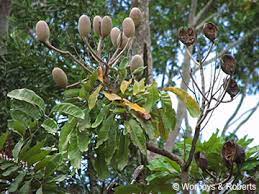Cardwellia

Cardwellia is a genus of a sole described species of large trees in the plant family Proteaceae. The species Cardwellia sublimis (northern silky oak) is endemic to the rainforests of the wet tropics region of northeastern Queensland, Australia. Other common names include bull oak, golden spanglewood, lacewood, oak and oongaary.[1] The compound leaves have up to 17 leaflets. It produces white inflorescences followed by woody fruits which are prominently displayed outside the canopy.[2]
Ferdinand von Mueller named the genus in honour of Edward Cardwell, who had been Secretary of State for the Colonies from 1864 to 1866. The species name is the Latin adjective sublimis “lofty”.[3] The type specimen was collected by John Dallachy in Rockingham Bay. Its everyday name in the local Dyirbal language was jungan, though a more general word gurruŋun “oak tree” (also applied to Darlingia ferruginea and Helicia australasica) was used in the taboo [Dyalŋuy] vocabulary.[4]
Molecular analysis indicates Cardwellia sublimis is a member of the subtribe Gevuininae,[5] and is the earliest offshoot from the main ancestor of the other genera. It is thought to have separated around 35 million years ago in the late Eocene.[6]
